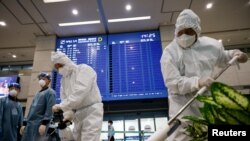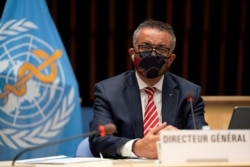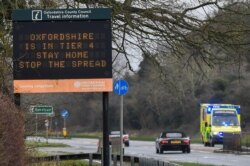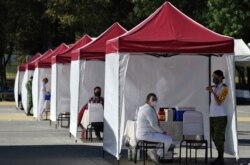The head of the World Health Organization is calling for an increase in genomic sequencing of the coronavirus after new variants have been detected in Britain and South Africa.
WHO Director-General Tedros Adhanom Ghebreyesus said at an online news conference Monday from Geneva that "only if countries are looking and testing effectively, will you be able to pick up variants and adjust strategies to cope."
He said WHO is working closely with scientists across the world to "better understand any and all changes to the virus" and their impacts, and he called on countries to share any genetic information with WHO and other countries.
British officials have said the new coronavirus variant first identified in the country is more contagious, leading to increased lockdowns and a wave of global travel restrictions on Britain.
On Monday, more countries, including Finland and South Korea, detected their first cases of a new coronavirus variant.
A Finnish citizen who had recently arrived from Britain for a Christmas vacation was diagnosed with the new variant, according to Finnish officials.
South Korea announced Monday that it would extend a ban on direct flights from Britain until January 7 after three people who recently entered the country tested positive for the COVID-19 variant.
The Korea Disease Control and Prevention Agency said the trio arrived on December 22 after a flight from London, making them the first known cases of the new version detected in South Korea.
Japan, which reported its first case of the virus variant last week, banned all non-resident foreigner arrivals from midnight Monday through the end of January.
Indonesia announced Monday that it will temporarily ban foreigners from entering the country for two weeks to try to stop the spread of the new variant.
Saudi Arabia said Monday it is extending its weeklong closure of all official ports because of the new variant.
Effective Monday, U.S. authorities said passengers arriving from Britain must test negative for COVID-19 72 hours before departure.
U.S. officials said nearly 1.3 million people went through U.S. airports on Sunday following the Christmas holiday, the highest level of air travel in more than nine months. The increased travel took place despite urgings from health officials not to travel during the holidays for fear of increasing the surge of coronavirus infections.
Russian officials said Monday that the country recorded 241,193 more deaths in April-November 2020 than during the same period the previous year. The number is significantly higher than the country's pandemic death toll of 55,265. The excess deaths could include deaths from COVID-19 that were not officially confirmed by medical officials, as well as deaths from other causes that could be linked to overcrowded hospitals caused by COVID-19 or other coronavirus effects on society.
Coronavirus vaccines
British authorities are expected to approve the AstraZeneca coronavirus vaccine this week, and the head of the company said it will be as effective against the virus as the Pfizer-BioNTech and Moderna vaccines.
AstraZeneca chief executive Pascal Soriot told The Times that the company has "figured out the winning formula and how to get efficacy that, after two doses, is up there with everybody else."
He added that he believes his company's vaccine will also be effective against the new variant of the virus.
If approved, AstraZeneca's vaccine will become the fifth to have been rolled out to fight the virus. Early tests showed that the vaccine was 70% effective for preventing illness, compared to 95% reported by Pfizer and its German partner BioNTech. Russia and China also have their own vaccines
Also Monday, another COVID-19 vaccine candidate is beginning its final-stage testing in the United States. The testing for the vaccine candidate, made by Novavax, will involve 30,000 volunteers to determine whether the vaccine is effective and safe. The trials will focus on high-risk older adults, as well as people from Black and Hispanic communities who have been disproportionately affected by the virus.
The latest vaccine on the horizon comes as the world reached the grim milestone of 81 million people worldwide infected by the virus with 1.7 million world deaths globally, according to the Johns Hopkins University.
In the United States, 19.2 million people have been infected and more than 334,000 have died.
New Year's celebrations
Meanwhile, the pandemic has prompted authorities in Australia to ban people from attending one of the world's most iconic New Year's celebrations.
New South Wales Premier Gladys Berejiklian announced Monday that Sydney Harbor would be closed to the public on New Year's Eve to prevent the disease from spreading outside the city's Northern Beach suburbs. A total of 125 people in that neighborhood have tested positive for COVID-19 since mid-December, including five new cases recorded Monday.
The annual New Year's observance features a spectacular fireworks display that lights up the nighttime skies over Sydney's famous Opera House. At least 1 million people are normally in attendance, but Berejiklian said the safest way for Sydney residents to view the fireworks is on television from home.
Megan Duzor and Richard Green contributed to this report.








